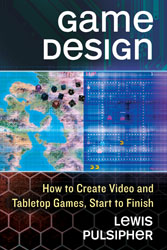Study Suggests Gamers are More Attractive as Mates
06 Aug
Posted by David Miller as Card Games, CCGs, Classic Board Games, Electronic Games, Gamification, Miniatures, Modern Board Games, RPGs, War Games
 A study published recently in the American Journal of Play [PDF], attempts to discern why adults play and comes up with some interesting results.
A study published recently in the American Journal of Play [PDF], attempts to discern why adults play and comes up with some interesting results.
Presumably, most of the skills that children need to be competent adults have been learned by the time they reach adulthood or, at least, learning them in the context of play has given way to learning them in the context of adult activities… With respect to adults, it is difficult to see how any possible future benefits of play could outweigh its immediate costs. Nevertheless, adult humans do play, commonly into old age.
Surveying university students, the study’s authors found that a playful attitude, sense of humor, and fun loving nature ranked among the most desirable characteristics in the selection of a long-term mate, easily beating out such factors as attractiveness and earning capacity. But why?
A study of previous literature and a breakdown of the survey results by gender suggest that the reasons are different for males and females:
For males, playfulness in females signals youth and, hence, fecundity; for females, playfulness in males signals nonaggressiveness.
[Source: The Strong]
- Comments Off on Study Suggests Gamers are More Attractive as Mates
Pulsipher on Game Design
02 Aug
Posted by David Miller as Card Games, CCGs, Electronic Games, Gamification, Miniatures, Modern Board Games, RPGs, War Games
 Lewis Pulsipher and McFarland press have published a new book titled, Game Design: How to Create Video and Tabletop Games, Start to Finish. Mr. Pulsipher is the designer of several board games, including Britannia and Dragon Rage, was an early D&D contributor, and is also a long-time game design educator. As he explained to me, the book is…
Lewis Pulsipher and McFarland press have published a new book titled, Game Design: How to Create Video and Tabletop Games, Start to Finish. Mr. Pulsipher is the designer of several board games, including Britannia and Dragon Rage, was an early D&D contributor, and is also a long-time game design educator. As he explained to me, the book is…
A practical rather than theoretical guide for beginners/inexperienced designers, based on my experience teaching game design as well as my experience as a game designer. While it is about video game design, it also doubles as a book for tabletop designers because the best way to start to learn video game design is to design tabletop games.
Games in Education Symposium
23 Jul
Posted by David Miller as Card Games, CCGs, Classic Board Games, Electronic Games, Gamification, Miniatures, Modern Board Games, RPGs, War Games
 The Games in Education Symposium takes place next week, Wednesday and Thursday, August 1st and 2nd, in Troy, New York. Hosted at the Esteves School of Education at the Sage Colleges, Games in Education includes such sessions as:
The Games in Education Symposium takes place next week, Wednesday and Thursday, August 1st and 2nd, in Troy, New York. Hosted at the Esteves School of Education at the Sage Colleges, Games in Education includes such sessions as:
- The Dos and Don’ts of Gamification: How to Use Game Mechanics for Meaningful Learning
- The Pedagogy of Game-Based Learning: How to Gamify Your Curriculum
- Using Board Games to Teach the Common Core
- Create Games, Don’t Just Play Them
- Teacher Professional Development as a Recreational Activity
Play Connects with Grants for Charity
18 Jul
Posted by David Miller as Card Games, CCGs, Classic Board Games, Electronic Games, Gamification, Miniatures, Modern Board Games, Other, RPGs, War Games
 The Toy Industry Foundation (TIF) is giving $10,000 grants to “direct service community-based charities and projects that align with the Toy Industry Foundation’s mission to bring joy, comfort, and learning to children in need through play.” To qualify for the Play Connects grants, a charity must be nominated by a member of the Toy Industry Association. Both nominations and grant proposals must be submitted by August 15th.
The Toy Industry Foundation (TIF) is giving $10,000 grants to “direct service community-based charities and projects that align with the Toy Industry Foundation’s mission to bring joy, comfort, and learning to children in need through play.” To qualify for the Play Connects grants, a charity must be nominated by a member of the Toy Industry Association. Both nominations and grant proposals must be submitted by August 15th.
- Comments Off on Play Connects with Grants for Charity
 With $10.3 million of funding from the Bill & Melinda Gates Foundation and the John D. and Catherine T. MacArthur Foundation, a new research facility is being developed to study the use of digital games in education. The GLASS Lab (Games, Learning and Assessment Lab) will be housed at the headquarters of Electronic Arts and managed by the Institute of Play.
With $10.3 million of funding from the Bill & Melinda Gates Foundation and the John D. and Catherine T. MacArthur Foundation, a new research facility is being developed to study the use of digital games in education. The GLASS Lab (Games, Learning and Assessment Lab) will be housed at the headquarters of Electronic Arts and managed by the Institute of Play.
GLASS Lab is based on the understanding that digital games and simulations can support student learning by providing immediate feedback for students, teachers and parents on students’ progress toward established learning goals.
[Source: The Gamification Corporation]
- Comments Off on GLASS Lab for Games and Learning
The 100 Games Everyone Should Play
08 Jun
Posted by David Miller as Card Games, CCGs, Classic Board Games, Electronic Games, Gamification, Miniatures, Modern Board Games, RPGs, War Games
 The 9th Annual Games for Change Festival (June 18-20 in New York City) is an opportunity to celebrate and study “entertainment and engagement leveraged for social good.”
The 9th Annual Games for Change Festival (June 18-20 in New York City) is an opportunity to celebrate and study “entertainment and engagement leveraged for social good.”
Leading up to the festival, the organizers are crowdsourcing a list of games everyone should play. Nominations and votes are being accepted through June 20th. Currently in the lead are Chess, Dungeons & Dragons, The Settlers of Catan, Tetris, and Go.
- Comments Off on The 100 Games Everyone Should Play
 “Gamification” is a term used to describe the application of game mechanics to drive real-world action. It’s a hot topic among marketers and game designers alike. Leading management consulting firms have predicted gamification to be one of the top disruptive technology trends of 2012 and that more than 50 percent of corporate innovation processes will be gamified by 2015.
“Gamification” is a term used to describe the application of game mechanics to drive real-world action. It’s a hot topic among marketers and game designers alike. Leading management consulting firms have predicted gamification to be one of the top disruptive technology trends of 2012 and that more than 50 percent of corporate innovation processes will be gamified by 2015.
Next week, the Games for Health Conference takes place in Boston. The week after will be The Gamification Summit in San Fransisco.
A recent Pew Research Center study, though, found conflicting opinions among tech experts regarding the future of gamification. Among those surveyed, 53 percent were of the opinion that the adoption of game mechanics for education, health, and work will have significantly advanced by 2020. However, 42 percent believed that gamification will only be implemented in select circumstances.
Tech stakeholders and analysts generally believe the use of game mechanics, feedback loops, and rewards will become more embedded in daily life by 2020, but they are split about how widely the trend will extend. Some say the move to implement more game elements in networked communications will be mostly positive, aiding education, health, business, and training. Some warn it can take the form of invisible, insidious behavioral manipulation.
Trending
- Are Board Games Dangerous?
- Home
- Haunted Mansion Game of (After-)Life
- Leave Your Paper Terrain in Ruins
- Toy Fair 2016—Lego Ninjago Sky Pirates
- USPS Adds Board Game Flat Rate Box
- Pixar Collectible Dominoes
- The 20 Most Valuable Vintage Board Games
- Toy Fair 2017—WS Game Company
- Anti-Bullying Board and Card Games
Archives
Most Popular Articles
- The 20 Most Valuable Vintage Board Games
- Sequence Game, and Variants
- USPS Adds Board Game Flat Rate Box
- Baila, the Estonian Drinking Card Game
- The 13 Most Popular Dice Games
- The Truth About Dominoes On Sunday in Alabama
- Are Board Games Dangerous?
- Oh the Irony—Illuminati Card Game Continues to Inspire Conspiracy Theorists
- The Convoluted Story of Iron Wind Metals, Ral Partha, and Battletech Miniatures
- What Happened to the Jewel Royale Chess Set?
Recent Posts
- Toy Fair 2019—Breaking Games
- Talisman Kingdom Hearts Edition
- Toy Fair 2019—Winning Moves
- Toy Fair 2019—Games Workshop
- Toy Fair 2019—Star Wars Lightsaber Academy
- Toy Fair 2019—Stranger Things Games
- Toy Fair 2019—HABA
- Licensing Roundup
- Game Bandit
- 2018 A Difficult Year For Hasbro But Not For D&D Or MtG
Recent Comments
- on Toy Fair 2019—Winning Moves
- on Game Bandit
- on Second Look—Dungeons & Dragons Waterdeep Dragon Heist
- on Crowdfunding Highlights
- on Beyblade SlingShock
- on Game Bandit
- on Game Bandit
- on Watch This Game!, the Board Game Review Board Game
- on Second Look—Vampire: The Masquerade 5th Edition
- on Palladium Books Loses Robotech IP License, Cancels Five-Year-Overdue Robotech RPG Tactics Kickstarter




